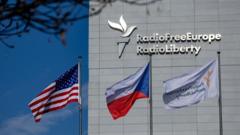The Czech Republic is rallying for support from the European Union to ensure the continuation of Radio Free Europe/Radio Liberty (RFE/RL) following substantial funding cuts enacted by the Trump administration. Czech Foreign Minister Jan Lipavsky emphasized that RFE/RL, headquartered in Prague, serves as “one of the few credible sources in dictatorships like Iran, Belarus, and Afghanistan.” Historically, during the Cold War, this US government-funded outlet provided millions in Eastern Europe with access to democratic values, despite the tight media controls imposed by communist governments.
Elon Musk, tasked with budget reductions under Trump, labeled RFE/RL as "radical left crazy people talking to themselves while torching $1B/year of US taxpayer money.” In a broader context, this move comes alongside Trump's explanation for closing down other information outlets like Voice of America, while raising concerns about the potential impact on global journalism.
Stephen Capus, President and CEO of RFE/RL, stated that terminating the broadcaster's grant agreement would represent a “massive gift to America's enemies,” expressing that “the Iranian Ayatollahs, Chinese communist leaders, and autocrats in Moscow and Minsk would celebrate the demise of RFE/RL after 75 years.” The sentiment was echoed by the independent Committee to Protect Journalists (CPJ), which warned that this funding cut could jeopardize the safety of countless journalists operating in environments where free expression is heavily suppressed.
Currently, RFE/RL claims it reaches nearly 50 million listeners in 23 nations, including pivotal countries like Russia, Ukraine, Iran, and Afghanistan. As a response, Lipavsky announced plans to meet with fellow EU foreign ministers to discuss strategies to “at least partially maintain its broadcasting” capabilities.
For decades, RFE/RL, Radio Free Asia, and Voice of America (VOA) have depended on support from the US Agency for Global Media (USAGM). The recent executive order signed by President Trump to slash their funding contrasts sharply with the strategies employed by governments in Russia, China, and Iran, which invest heavily in their state-run media to diminish the influences of Western liberalism globally.
Amid these shifts, the turmoil at the VOA has been palpable; reports indicated that most of its full-time staff were placed on administrative leave, resulting in layoffs among the contractors who make up a significant portion of non-English language services.





















